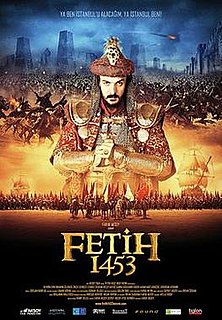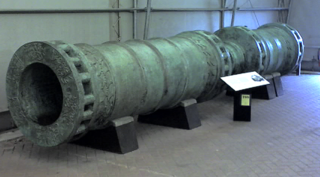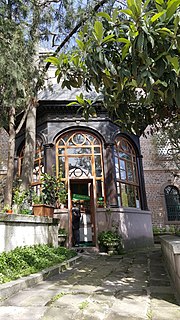 W
WThe Fall of Constantinople was the capture of the Byzantine Empire's capital by the Ottoman Empire. The city fell on 29 May 1453, the culmination of a 53-day siege which had begun on 6 April 1453.
 W
WÇandarlı Halil Pasha, known as the Younger, was a highly influential Ottoman grand vizier under the sultans Murad II and, for the first few years of his reign, Mehmed II. He was a member of the Çandarlı family, a highly influential political family in the Ottoman Empire. His grandfather and namesake, Çandarlı Kara Halil Hayreddin Pasha, also earlier served as grand vizier, under Murad I.
 W
WConstantine XI Dragases Palaiologos or Dragaš Palaeologus was the last Byzantine emperor, reigning from 1449 to his death in battle at the Fall of Constantinople in 1453. Constantine's death marked the end of the Byzantine Empire, an institution tracing its origin to Constantine the Great's foundation of Constantinople as the Roman Empire's new capital in 330. Since the Byzantine Empire was the Roman Empire's medieval continuation, with its citizens continually referring to themselves as Romans, Constantine XI's death and Constantinople's fall also marked the definitive end of the Roman Empire, founded by Augustus almost 1,500 years earlier.
 W
WThe Dark Angel is a novel by Finnish author Mika Waltari about a hopeless love affair and the Fall of Constantinople. The Finnish version was originally published in 1952, with an English edition being published in Great Britain in 1953.
 W
WFetih 1453 is a 2012 Turkish epic action film directed by Faruk Aksoy and produced by Faruk Aksoy, Servet Aksoy and Ayşe Germen. Starring Devrim Evin, İbrahim Çelikkol and Dilek Serbest, the film is based on events surrounding the Fall of Constantinople to the Ottoman Turks during the reign of Sultan Mehmed II.
 W
WIsidore of Kiev, also known as Isidore of Thessalonica was a Byzantine Greek Metropolitan of Kiev, cardinal, humanist, and theologian. He was one of the chief Eastern defenders of reunion at the time of the Council of Florence.
 W
WMehmed II, commonly known as Mehmed the Conqueror, was an Ottoman Sultan who ruled from August 1444 to September 1446, and then later from February 1451 to May 1481. In Mehmed II's first reign, he defeated the crusade led by John Hunyadi after the Hungarian incursions into his country broke the conditions of the truce Peace of Szeged. When Mehmed II ascended the throne again in 1451 he strengthened the Ottoman navy and made preparations to attack Constantinople. At the age of 21, he conquered Constantinople and brought an end to the Byzantine Empire.
 W
WOrban, also known as Urban, was an iron founder and engineer from Brassó, Transylvania, in the Kingdom of Hungary, who cast large-calibre artillery for the Ottoman siege of Constantinople in 1453.
 W
WZaganos or Zagan Pasha was an Albanian Ottoman military commander, with the titles and ranks of kapudan pasha and the highest military rank, grand vizier, during the reign of Sultan Mehmed II "the Conqueror". Originally a Christian who was conscripted and converted through the devşirme system, he became a Muslim and rose through the ranks of the janissaries. He became one of the prominent military commanders of Mehmed II and a lala – the sultan's advisor, mentor, tutor, councillor, protector, all at once. He removed his rival, the previous Grand Vizier Çandarlı Halil Pasha the Younger, amid the fall of Constantinople. He later served as the governor of Thessaly of Macedonia.